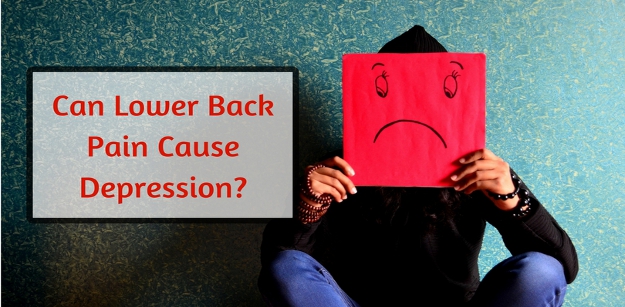This is the big question on everyone’s mind… “What exactly in the link between depression and back pain?” People who suffer intense back aches are often depressed. This is not surprising as the persisting pain can drain your energy, taking away every bit of motivation from you.
Severe back pain can stop you from moving freely and enjoying your favourite activities, increasing the amount of stress you face on a daily basis. If you suffer from lower back pain you may know that it stops you in your tracks. You may be unable to move, unable to work or function as you would normally. Not to mention the aches and pains that some describe as being excruciating. Introducing the best posture corrector could be a life-changing solution for managing such disruptive pain, enabling you to regain mobility and enjoy your daily activities with reduced discomfort.


All of this can drain you emotionally and leave you feeling depressed. It is worthy of note that even some medications used in the treatment of back pain can cause symptoms of depression in the long run.
Research has shown that in some studies, the rate of depression is directly proportional to the severity of the back pain the person has. A University of Sydney study reveals people with depression are 60% more likely to develop low back pain at some point in their life.
It is a fact that while back pain may trigger depression, depression could also trigger back pain.
It should be noted that back pain is one of the major symptoms of depression. Studies have shown that persons who experience depression very frequently also have more intense back pain than others. Research has shown that depression enhances inflammatory responses and pain through the release of cytokines, a group of proteins that influences the actions of the immune system. The blood concentration of cytokines are higher in depressed people than in those who are not depressed.
Another means by which depression causes back pain is through fatigue. When you are fatigued, you are unable to exercise and move your muscles. Because of this, greater stress is added to the ligaments, the joints and the discs in the back, increasing your susceptibility to back pain, strains on the muscles and localised injuries.
In a nutshell, depression causes pain not directly, but indirectly by enhancing the chemical and physical processes that actually causes back pain.
Surgical patients may suffer from the effects of depression
Studies have shown that patients who have recently undergone spinal surgery may be affected negatively by depression. This may be because of the psychological impact that it has.
For instance, several factors may contribute to depression after surgery, including:
- The quality of sleep one experiences after surgery
- Motivation
- Strict compliance to rehabilitation programs
Patients are advised to consult their local health professional when they experience signs of depression alongside back pain. Signs of depression that you should watch out for include:
- Irritability
- Sad feelings
- Unexplainable fatigue
- Sleep disorders
- Weak appetite
- Binge eating
- Suicidal tendencies, and
- An inability to concentrate
A comprehensive approach is needed for the treatment of patients with chronic back conditions
What exactly is a chronic pain condition? According to a media release published by Dr. Ian Deitch (Chiropractor), “The Australian Institute of Health and Welfare defines chronic back pain as a health condition that lasts for three months or longer”.
We know that living a sedentary lifestyle (sitting all day, commuting, not exercising) and poor posture are chronic pain risk factors. The positive news is that it’s not too late to improve your spinal health.
“Simple measures such as incorporating walking into your daily routine can improve chronic back pain symptoms. Walking keeps the spine active and mobile. Improving posture can also help to relieve strain on the spine and improve circulation.” Dr. Deitch (Chiropractor) said.
A combined approach
Patients requiring treatment for back aches do so with great desperation. They feel that all will be well once the pain is done away with. This is right nonetheless. Nevertheless, it is best to treat pain and depression simultaneously. Patients who have undergone or are about to undergo spinal surgery should take this into consideration. With this, they have the best potential for great results after surgery.
Aerobic exercise is also effective in the treatment of low back pain and depression. Exercise triggers the secretion of a neurotransmitter, serotonin, which then stimulates the release of endorphins, thus relieving pain and depression. Before embarking on any exercise program, patients are advised to consult their local health practitioner for advice on this matter. Exercise programs come with a myriad of benefits such as flexibility improvement, reduction of pain and stiffness, mood booster, strengthening of back muscles, and boosting the self-esteem.



